10 Sanskrit Quotes That Will Change Your Perspective on Life
In a world bustling with modernity and rapid change, the timeless wisdom encapsulated in Sanskrit quotes provides us with profound insights that can alter our perspective on life. These ancient sayings, steeped in culture and spirituality, hold the power to inspire and motivate us toward growth and self-discovery. From the revered texts of the Bhagavad Gita to the philosophical musings found in the Upanishads, these Sanskrit proverbs are not just relics of a bygone era; they are treasures of knowledge that resonate across generations. As we delve into ten unconventional Sanskrit quotes, you’ll discover how these sacred verses can guide you through life’s challenges, encourage introspection, and illuminate the path toward a more fulfilling existence.
- “यत्र योगेश्वरः कृष्णो यत्र पार्थो धनुर्धरः। तत्र श्रीर्विजयो भूतिर्ध्रुवा नीतिर्मतिर्मम॥” – Bhagavad Gita 18.78
- “सर्वं ज्ञानं परमात्मन्येव निहितं।” – Upanishads
- “कर्मण्येवाधिकारस्ते मा फलेषु कदाचन।” – Bhagavad Gita 2.47
“Your right is to perform your duty only, but never to its fruits.” – This quote emphasizes the importance of focusing on one’s actions rather than being consumed by the outcome.
The ability of these quotes to resonate with our current circumstances is a testament to their eternal truths. Whether you seek motivation during trying times or wisdom for everyday decisions, these Sanskrit teachings provide clarity and perspective that are often sought yet rarely found in today’s fast-paced environment.
As we explore each quote’s meaning and implications, allow yourself to reflect on how these philosophical gems can be woven into your daily life for deeper understanding and spiritual enlightenment.
1. तत् त्वम् असि (Tat Tvam Asi)
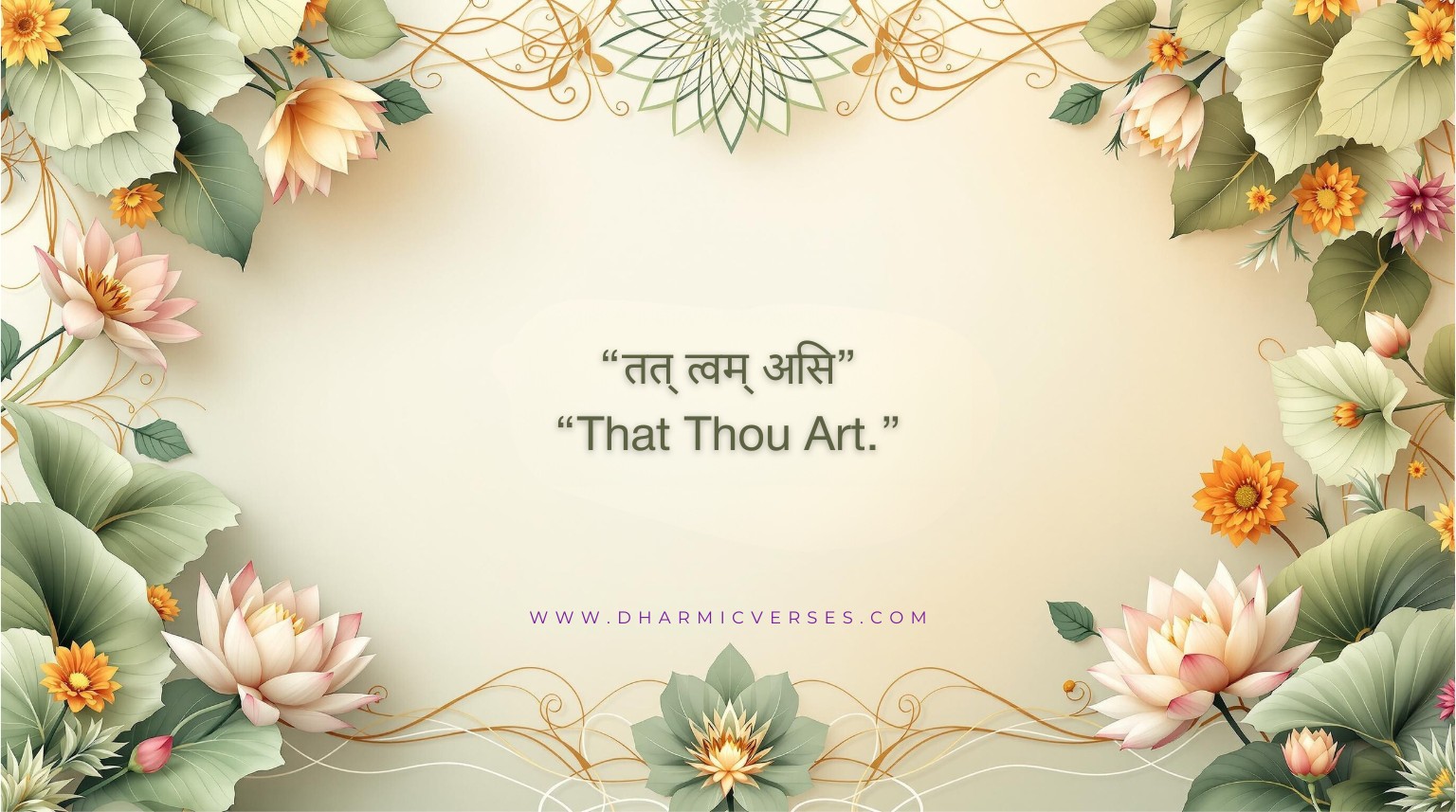
When we think of profound wisdom, few phrases encapsulate the essence of self-realization and interconnectedness like “तत् त्वम् असि” (Tat Tvam Asi). This powerful Sanskrit quote, translating to “That Thou Art,” originates from the Chandogya Upanishad, one of the most revered texts in Indian philosophy. It invites us to explore the profound connection between our individual selves and the universal consciousness.
“तत् त्वम् असि” – “That Thou Art.”
This phrase serves as a reminder that we are not separate entities wandering aimlessly; rather, we are an intrinsic part of a larger cosmic existence. Here are several key takeaways that can help transform your perspective on life through this timeless teaching:
- Unity in Diversity: The idea that our essence is not different from the universe encourages us to cultivate compassion towards others. If we view everyone as part of a greater whole, our interactions become infused with empathy and understanding.
- Self-Inquiry: Adopting this mantra inspires deep self-reflection. Ask yourself: Who am I beyond my titles and roles? What is my true nature? Such introspection can lead to significant personal growth.
- Spiritual Awakening: Recognizing our oneness with the cosmos can catalyze spiritual enlightenment. It pushes us towards practices like meditation and yoga, which foster a deeper sense of connection.
The teachings of “Tat Tvam Asi” assert that by understanding our true nature, we can lead more fulfilling lives. We begin to let go of superficial desires and embrace authenticity. Following this principle enables us to experience freedom from societal conditioning and limiting beliefs.
As you navigate your journey through life, remember that every challenge is an opportunity for growth. The wisdom embedded in ancient Sanskrit sayings like “Tat Tvam Asi” not only provides clarity but also serves as guidance toward realizing your deeper purpose. Embrace this journey of discovery, for in it lies the key to unlocking your fullest potential.
2. आत्मा एव ह्यात्मनो बन्धु: (Ātmā eva hyātmano bandhuḥ)
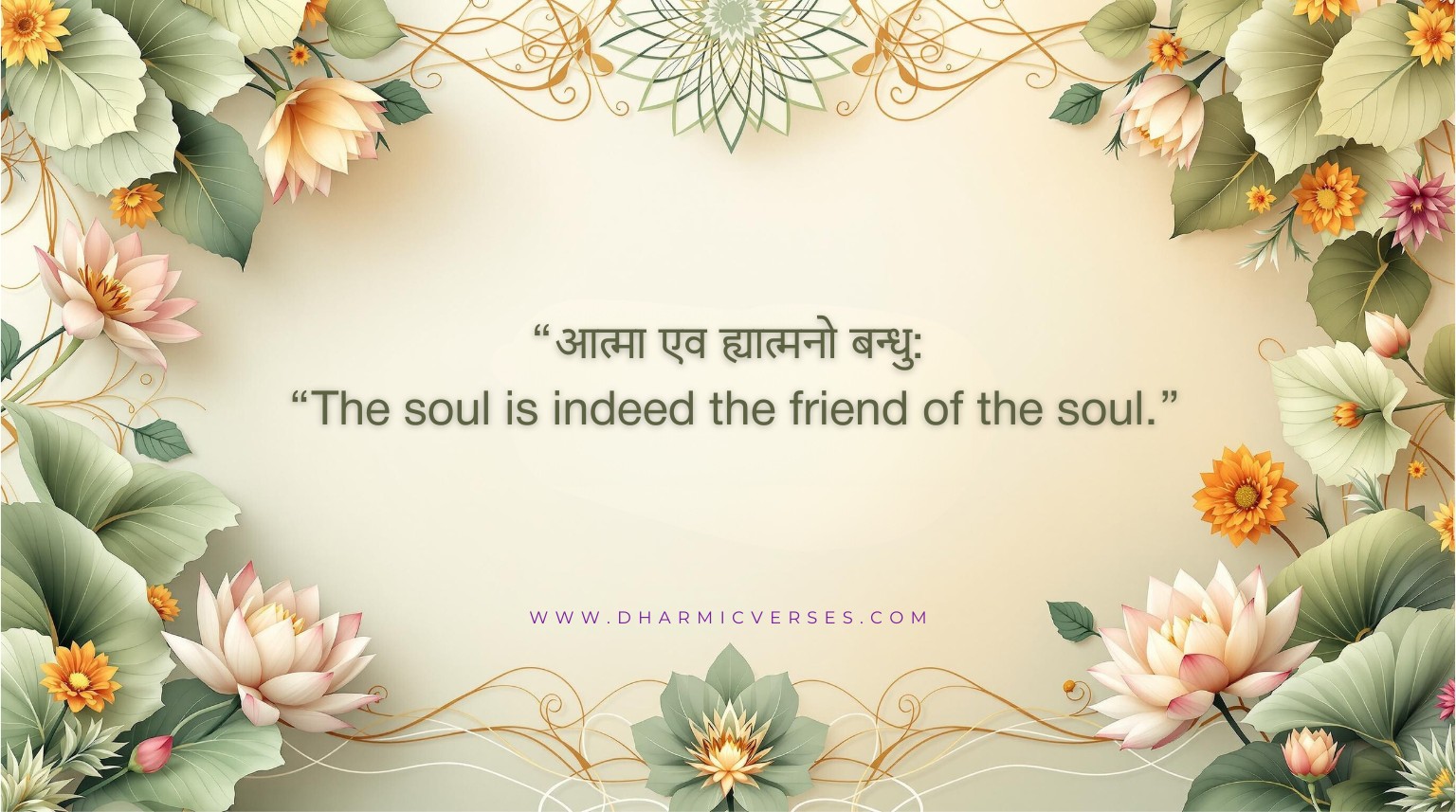
Continuing our exploration of transformative Sanskrit quotes, we delve into the profound wisdom of “आत्मा एव ह्यात्मनो बन्धु:” (Ātmā eva hyātmano bandhuḥ), which translates to “The soul is indeed the friend of the soul.” This enlightening phrase serves as a reminder that our greatest ally in life is not external but rather an intrinsic part of ourselves.
“आत्मा एव ह्यात्मनो बन्धु:” – “The soul is indeed the friend of the soul.”
This quote emphasizes self-awareness and the importance of nurturing our inner selves. Here’s how this powerful sentiment can change your perspective on life:
- Self-Compassion: Understanding that your soul is a friend encourages you to practice self-kindness. Instead of harsh criticism, treat yourself with love and understanding, especially during challenging times.
- Inner Guidance: The essence of this saying points to trusting your intuition. Engaging with your inner voice can lead to decisions aligned with your authentic self, steering you toward fulfillment.
- Empowerment: Realizing you are both the seeker and the source empowers you. You possess the tools necessary for growth and happiness within yourself; it’s about tapping into that reservoir of strength.
This wisdom resonates deeply in a world where external validation often overshadows self-acceptance. By embracing Ātmā eva hyātmano bandhuḥ, you cultivate a relationship with yourself that promotes personal evolution and emotional resilience.
The teachings of this Sanskrit quote remind us that while friends may come and go, our soul remains a steadfast companion on our journey through life. As you reflect on this idea, consider how fostering a deeper connection with yourself can illuminate your path forward—leading to greater peace, understanding, and joy.
3. दुःखेष्वनुद्विग्नमनाः (Duḥkheṣv anudvigna-manāḥ)
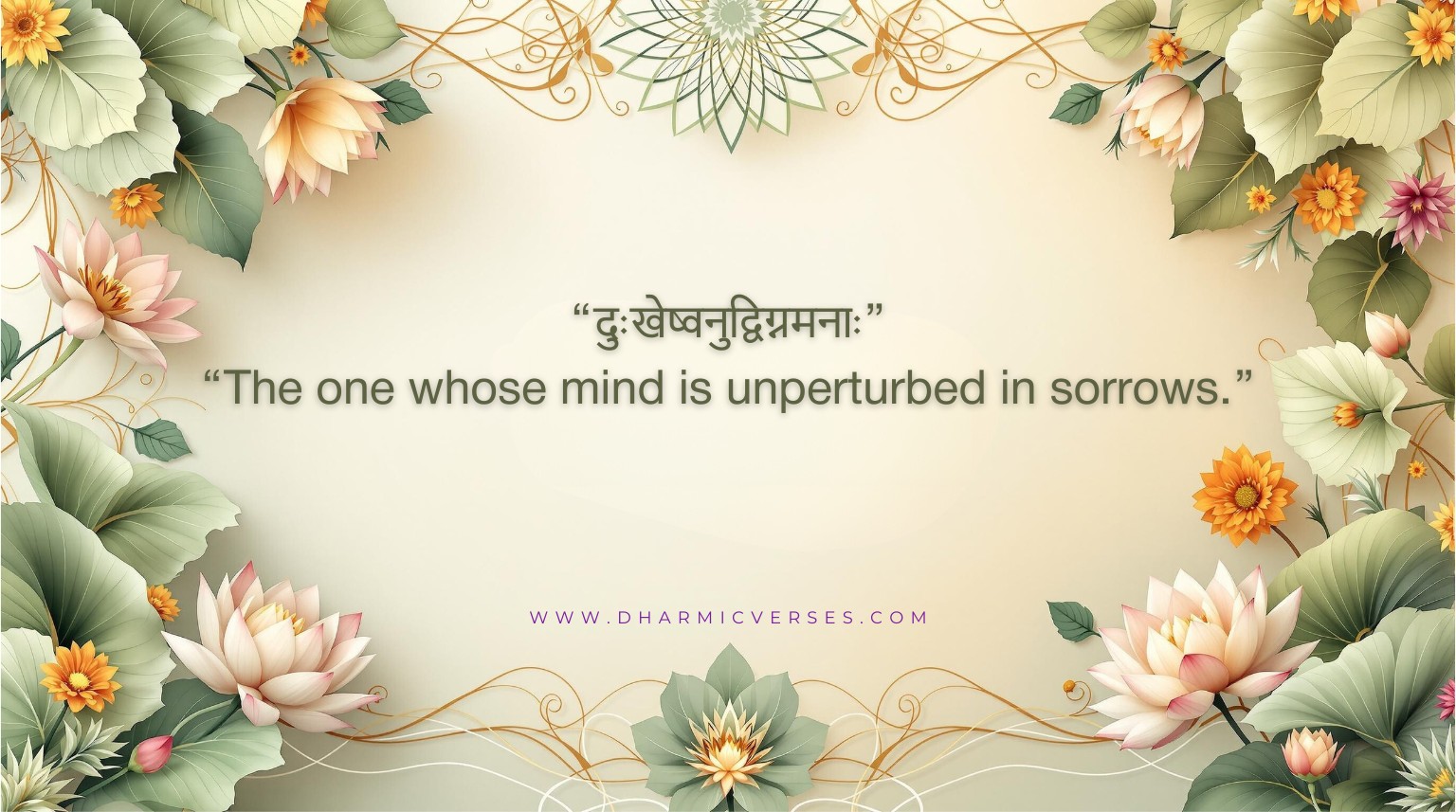
One of the most profound and reassuring Sanskrit quotes is “दुःखेष्वनुद्विग्नमनाः” (Duḥkheṣv anudvigna-manāḥ), translating to “The one whose mind is unperturbed in sorrows.” This timeless wisdom encourages us to cultivate equanimity amidst life’s inevitable challenges. Often, we find ourselves swept away by the tides of emotional turbulence, but this quote serves as a gentle reminder to remain steadfast through the storms.
“दुःखेष्वनुद्विग्नमनाः” – “The one whose mind is unperturbed in sorrows.”
Understanding and applying this principle can significantly shift your perspective on life. Here are some key insights that arise from this ancient saying:
- Resilience in Adversity: Life is filled with ups and downs. This quote teaches us to develop resilience, revealing that true strength lies in maintaining our composure during difficult times. Embracing challenges as opportunities for growth can change your outlook entirely.
- Mental Fortitude: Unperturbedness does not imply a lack of feeling; rather, it suggests a balanced approach to life’s trials. By training the mind to stay calm, we can think clearly and make better decisions when faced with adversity.
- Mindfulness Practice: Incorporating mindfulness techniques such as meditation can help cultivate this state of being. A daily practice will enhance your ability to observe your thoughts without getting caught up in them, leading to a more peaceful existence.
The essence of “Duḥkheṣv anudvigna-manāḥ” teaches us that while we may not have control over external circumstances, we do have command over our reactions. The teachings suggest that by fostering inner tranquility, we become less susceptible to life’s inevitable fluctuations.
This wisdom echoes throughout sacred texts like the Bhagavad Gita where Lord Krishna imparts knowledge about maintaining poise amid chaos. Such principles are not only relevant but essential in today’s fast-paced world where stress often overwhelms us. By embodying this Sanskrit quote, you align yourself with eternal truths that guide you toward spiritual fortitude and emotional balance.
In conclusion, as you navigate through life’s rollercoaster, remember: like a steady ship amidst raging seas, remaining undisturbed by sorrow transforms your journey into one of grace and purpose. Embrace the teachings of “Duḥkheṣv anudvigna-manāḥ” for a more harmonious existence.
4. वसुधैव कुटुम्बकम् (Vasudhaiva Kutumbakam)
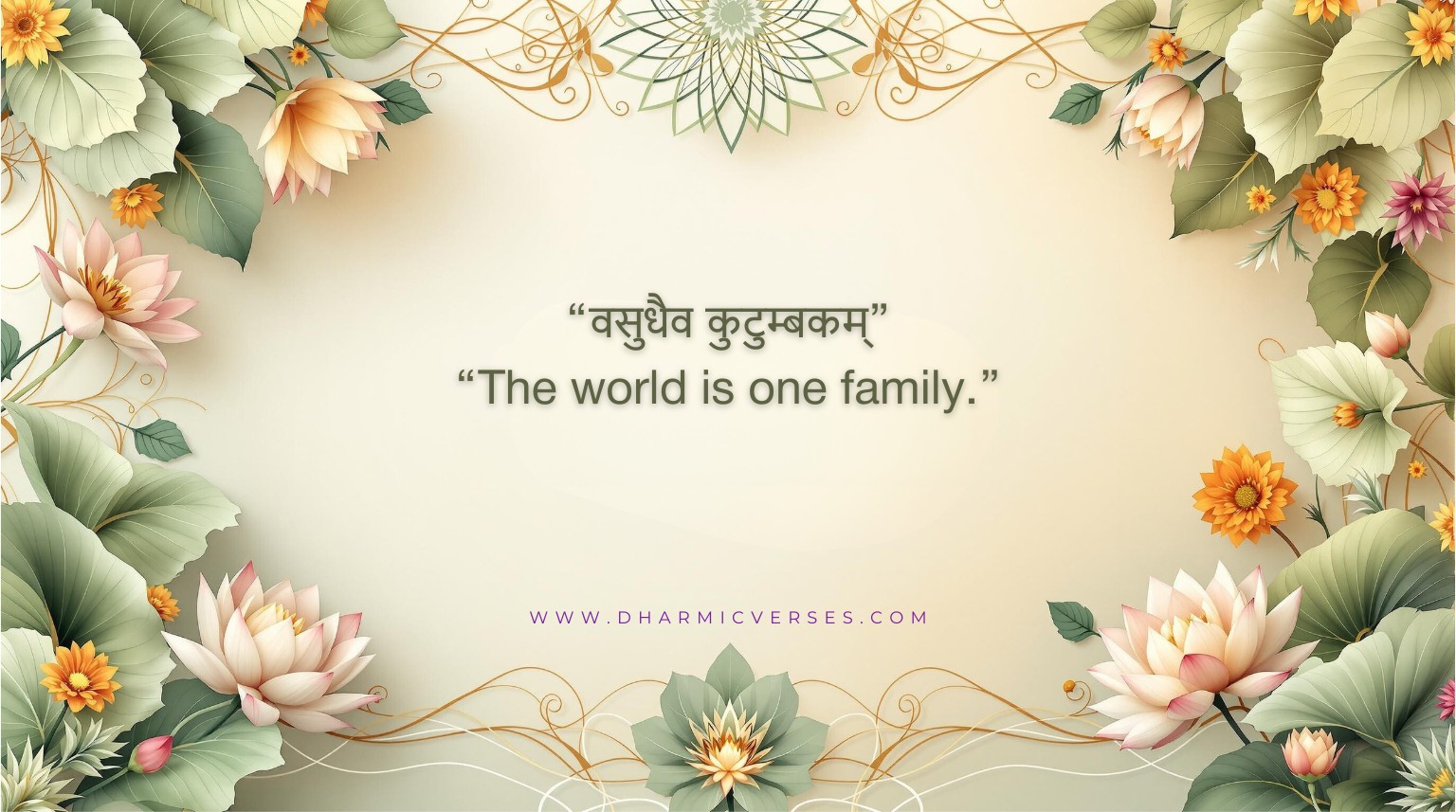
As we journey through the rich tapestry of Sanskrit wisdom, we encounter the profound phrase “वसुधैव कुटुम्बकम्” (Vasudhaiva Kutumbakam), which translates to “The world is one family.” This timeless saying, rooted in ancient Indian philosophy, serves as a powerful reminder of our interconnectedness and shared humanity. It draws from the belief that every individual, regardless of background or belief, is part of a greater whole—a universal kinship that transcends borders.
“वसुधैव कुटुम्बकम्” – “The world is one family.”
This enlightening concept can dramatically shift your perspective on life in several ways:
- Promoting Global Unity: In an era marked by division and conflict, embracing the idea of Vasudhaiva Kutumbakam fosters compassion and empathy. It encourages us to see beyond our differences and work towards collective well-being.
- Cultivating Tolerance: Recognizing that we all belong to one family allows for deeper understanding and acceptance of diverse cultures and beliefs. This can lead to meaningful dialogues and partnerships that enrich our lives.
- Encouraging Responsibility: If the world is indeed one family, then each of us has a role in ensuring its health and happiness. This principle pushes us toward social responsibility—acting not just for personal gain but for the welfare of all.
The essence of Vasudhaiva Kutumbakam resonates throughout various sacred texts, including the Mahabharata, where the interconnectedness of humanity is celebrated. For instance, it echoes sentiments found in modern global movements advocating for peace and sustainability.
This quote encourages us to reflect on our personal lives as well. Consider how your actions impact not only your immediate circle but also contribute to the larger global community. Are you nurturing relationships with kindness? Are you making choices that promote harmony within this familial network?
In a world constantly striving for connection amid chaos, embracing the wisdom of Vasudhaiva Kutumbakam can guide us toward a more compassionate existence. By fostering this outlook, we pave the way for greater understanding and collaboration across cultures—transforming our global village into a thriving sanctuary for all its inhabitants.
5. कर्मण्येवाधिकारस्ते मा फलेषु कदाचन (Karmaṇy-evādhikāras te mā phaleṣu kadācana)![कर्मण्येवाधिकारस्ते मा फलेषु कदाचन (Karmaṇy-evādhikāras te mā phaleṣu kadācana)]()
One of the most striking and motivational Sanskrit quotes is “कर्मण्येवाधिकारस्ते मा फलेषु कदाचन” (Karmaṇy-evādhikāras te mā phaleṣu kadācana), which translates to “Your right is to perform your duty only, but never to its fruits.” Found in the Bhagavad Gita (2.47), this profound statement serves as a guiding principle for navigating life’s complexities.
“कर्मण्येवाधिकारस्ते मा फलेषु कदाचन” – “Your right is to perform your duty only, but never to its fruits.”
This quote invites us to focus on our actions rather than becoming entangled in the outcomes. Here are some key insights that can transform your perspective through this ancient wisdom:
- Emphasis on Action: We often get caught up in the results of our efforts, which can lead to stress and anxiety. This quote reminds us that our responsibility lies in performing our duties diligently, irrespective of the results. By committing ourselves fully to our actions, we cultivate a sense of purpose.
- Letting Go of Attachment: The idea behind this teaching is not about dismissing outcomes but about fostering detachment from them. By practicing non-attachment, we can experience greater peace and clarity, allowing us to navigate challenges without being overwhelmed by fear of failure.
- Encouraging Personal Growth: When we shift our focus from results to efforts, we create an environment conducive to personal development. Each action becomes a learning opportunity—whether it leads to success or not, lessons abound.
The wisdom of “Karmaṇy-evādhikāras te mā phaleṣu kadācana” echoes through various spheres—be it professional endeavors or personal aspirations. For example, consider athletes who dedicate themselves tirelessly to training regardless of whether they win medals; their commitment defines their journey rather than mere accolades.
This quote also resonates deeply with spiritual practices where seekers are encouraged to surrender the outcomes of their efforts. In yoga and meditation, practitioners are taught that the process itself—the breath, the movement—is what matters most; results will follow naturally if one remains committed.
As you go about your daily life, reflect on how this principle applies to you. Are you overly fixated on achieving specific results? How might embracing a focus on action instead lead you toward more meaningful experiences? By embodying this timeless teaching from the Bhagavad Gita, you equip yourself with a profound tool for navigating both life’s trials and triumphs with grace and resilience.
6. अहिंसा परमो धर्मः (Ahimsā paramo dharmaḥ)
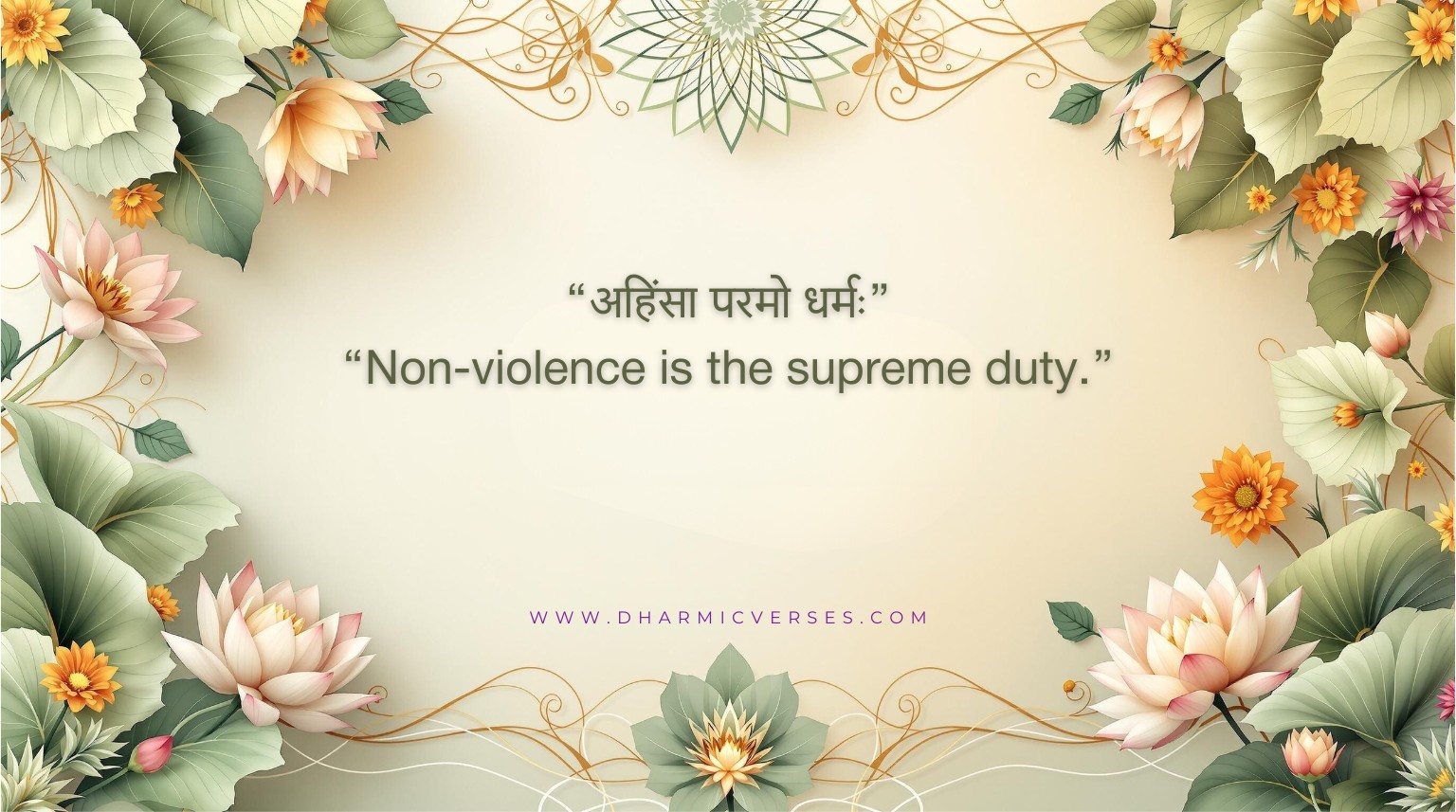
When discussing the core tenets of Dharma, one quote that resonates deeply is “अहिंसा परमो धर्मः” (Ahimsā paramo dharmaḥ), translating to “Non-violence is the supreme duty.” This powerful Sanskrit phrase encapsulates a philosophy that goes beyond mere abstention from physical violence; it emphasizes compassion in thoughts, words, and actions. Rooted in ancient texts such as the Mahabharata and echoed throughout Vedic literature, this timeless wisdom encourages us to cultivate a mindset that prioritizes peace and understanding.
“अहिंसा परमो धर्मः” – “Non-violence is the supreme duty.”
This profound teaching can significantly shift our perspective on life by offering insights into how we interact with ourselves and others. Here are some key takeaways:
- Inner Peace: Practicing ahimsa starts within. By fostering a non-violent mindset towards ourselves—through self-compassion and positive self-talk—we create a foundation for harmony that extends to our interactions with others.
- Compassionate Living: The principle of non-violence urges us to act with empathy in all situations. Consider how your words and actions affect those around you, promoting kindness even in disagreements. This can lead to healthier relationships and a more peaceful society.
- Moral Responsibility: Embracing ahimsa also entails acknowledging our responsibilities toward all living beings. Whether it’s through ethical consumer choices or advocating for justice, this principle pushes us to contribute positively to the world.
The teachings of “Ahimsā paramo dharmaḥ” remind us that violence need not be confined to physical acts; it also encompasses emotional and psychological harm. In a world rife with conflict, embracing non-violence can serve as a catalyst for change, allowing us to respond rather than react—transforming adversities into opportunities for growth.
This Sanskrit quote resonates particularly well today when discussions around mental health and emotional intelligence are gaining prominence. By practicing non-violence in our internal dialogues—silencing the inner critic—we pave the way for a more fulfilling existence. A study conducted by the American Psychological Association indicates that self-compassion is linked to greater emotional resilience (source: APA.org).
As we move forward, let’s reflect on how adopting ahimsa can manifest in our daily lives. Are there areas where we may inadvertently cause harm? How can we shift our mindset towards compassion? By integrating the essence of “Ahimsā paramo dharmaḥ” into our lives, we not only transform ourselves but also contribute towards creating a more harmonious world.
7. अनित्यमसुखं लोकम् इमं प्राप्य भजस्व माम् (Anityam-asukhaṃ lokam imaṃ prāpya bhajasva mām)

Among the gems of Sanskrit wisdom, the quote “अनित्यमसुखं लोकम् इमं प्राप्य भजस्व माम्” (Anityam-asukhaṃ lokam imaṃ prāpya bhajasva mām) translates to “Having attained this transient and sorrowful world, seek refuge in Me.” This phrase encourages us to recognize the impermanence of worldly pleasures and emphasizes the importance of seeking deeper spiritual fulfillment.
“अनित्यमसुखं लोकम् इमं प्राप्य भजस्व माम्” – “Having attained this transient and sorrowful world, seek refuge in Me.”
This profound teaching serves as a reminder that while life may bring temporary joys, it is often accompanied by challenges and suffering. Here are some key insights derived from this Sanskrit quote that can transform your perspective on life:
- The Nature of Impermanence: Life is transient; understanding this fundamental truth can alleviate our attachment to fleeting pleasures. By recognizing that everything is subject to change, we learn to appreciate moments without clinging to them.
- Seeking Deeper Meaning: Instead of getting lost in the pursuit of material gains or superficial happiness, this teaching urges us to explore what brings lasting fulfillment. Engaging in spiritual practices—like meditation or service—can provide a sense of peace that transcends worldly concerns.
- The Importance of Spiritual Refuge: The latter part of the quote emphasizes seeking refuge in divine guidance. Establishing a connection with the sacred can help anchor us during turbulent times and offer comfort amidst life’s inevitable uncertainties.
This wisdom resonates with teachings found throughout various texts, including the Bhagavad Gita and Upanishads, where seekers are encouraged to turn inward for ultimate happiness rather than relying solely on external circumstances. For instance, Lord Krishna advises Arjuna throughout their dialogue about finding strength and solace through devotion.
In our contemporary context, many studies highlight a significant correlation between spiritual practices and well-being. Research published in the journal *Psychological Science* suggests that engaging with spirituality can lead to improved mental health
As you reflect on “Anityam-asukhaṃ lokam imaṃ prāpya bhajasva mām,” consider how focusing on eternal truths rather than transient experiences can reshape your approach to life’s challenges. Are there areas where you’re clinging too tightly? How might embracing impermanence lead you toward more authentic connections? This Sanskrit teaching invites us not just to endure life’s trials but to transcend them by anchoring ourselves in what truly matters—finding serenity within while navigating a tumultuous world.
8. उद्यमेन हि सिद्ध्यन्ति कार्याणि न मनोरथैः (Udyamena hi siddhyanti kāryāṇi na manorathaiḥ)
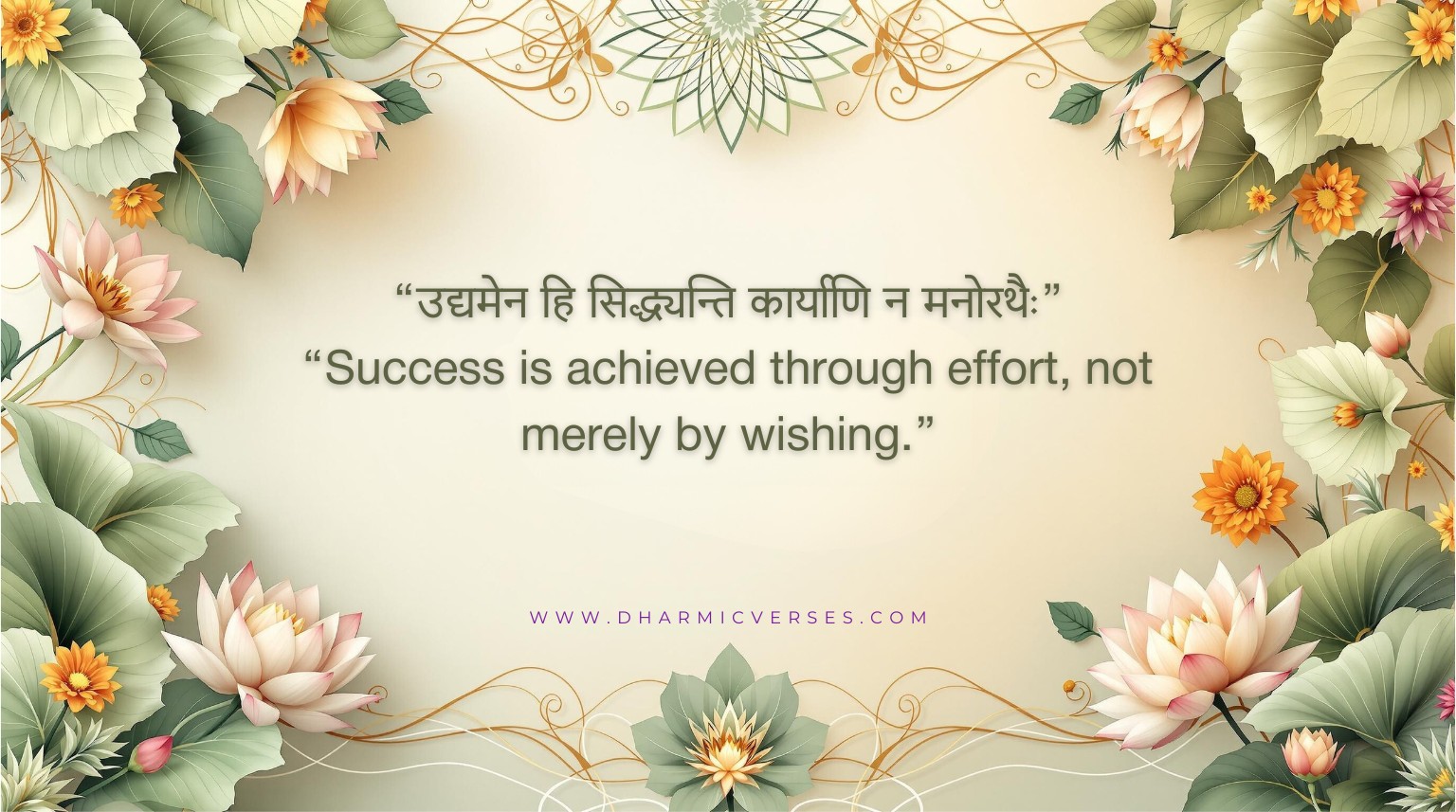
Among the myriad pearls of wisdom found in Sanskrit literature, the quote “उद्यमेन हि सिद्ध्यन्ति कार्याणि न मनोरथैः” (Udyamena hi siddhyanti kāryāṇi na manorathaiḥ) beautifully encapsulates the essence of effort and determination. Translated, it means “Success is achieved through effort, not merely by wishing.” This timeless teaching serves as a powerful reminder that while dreams and aspirations are important, they must be accompanied by action to bear fruit.
“उद्यमेन हि सिद्ध्यन्ति कार्याणि न मनोरथैः” – “Success is achieved through effort, not merely by wishing.”
This quote is particularly relevant in today’s fast-paced world where instant gratification often tempts us to forsake hard work for shortcuts. Here are some key insights derived from this profound Sanskrit saying that can alter your perspective on life:
- The Value of Hard Work: This teaching emphasizes that diligence is a key ingredient for success. Whether you’re navigating your career or pursuing personal goals, consistent effort lays the foundation for achievement.
- Overcoming Procrastination: By reminding us that mere thoughts or wishes will not bring results, this quote encourages action. It nudges us to take the first step and dismantle procrastination—after all, every great journey begins with a single step.
- A Growth Mindset: Embracing the idea that effort leads to success cultivates resilience and patience. Challenges become stepping stones rather than obstacles when we recognize that every endeavor requires persistence.
The wisdom behind “Udyamena hi siddhyanti kāryāṇi na manorathaiḥ” resonates deeply in various walks of life—from students striving for academic excellence to entrepreneurs launching innovative ventures. For example, consider inventors like Thomas Edison who famously noted,
“Genius is one percent inspiration and ninety-nine percent perspiration.”
His journey illustrates that tireless efforts pave the way for groundbreaking successes.
This Sanskrit quote also echoes teachings from the Bhagavad Gita where Lord Krishna encourages Arjuna to act without attachment to results. The act of engaging wholeheartedly in one’s work can lead not only to personal growth but also fulfillment beyond mere outcomes.
In our contemporary context, numerous studies have highlighted the importance of grit and perseverance as predictors of success. Research from Angela Duckworth underscores how sustained effort contributes significantly more than innate talent.
As you ponder upon “Udyamena hi siddhyanti kāryāṇi na manorathaiḥ,” reflect on your own aspirations and consider where you might be holding back due to wishful thinking rather than taking actionable steps. Are there dreams that have been shelved due to fear or inertia? How might focusing on diligent effort transform your reality? By embodying this powerful teaching from ancient Sanskrit wisdom, you unlock pathways to success grounded in determination and resilience—an empowering approach toward realizing your fullest potential.
9. विद्या विनयेन शोभते (Vidyā vinayena śobhate)
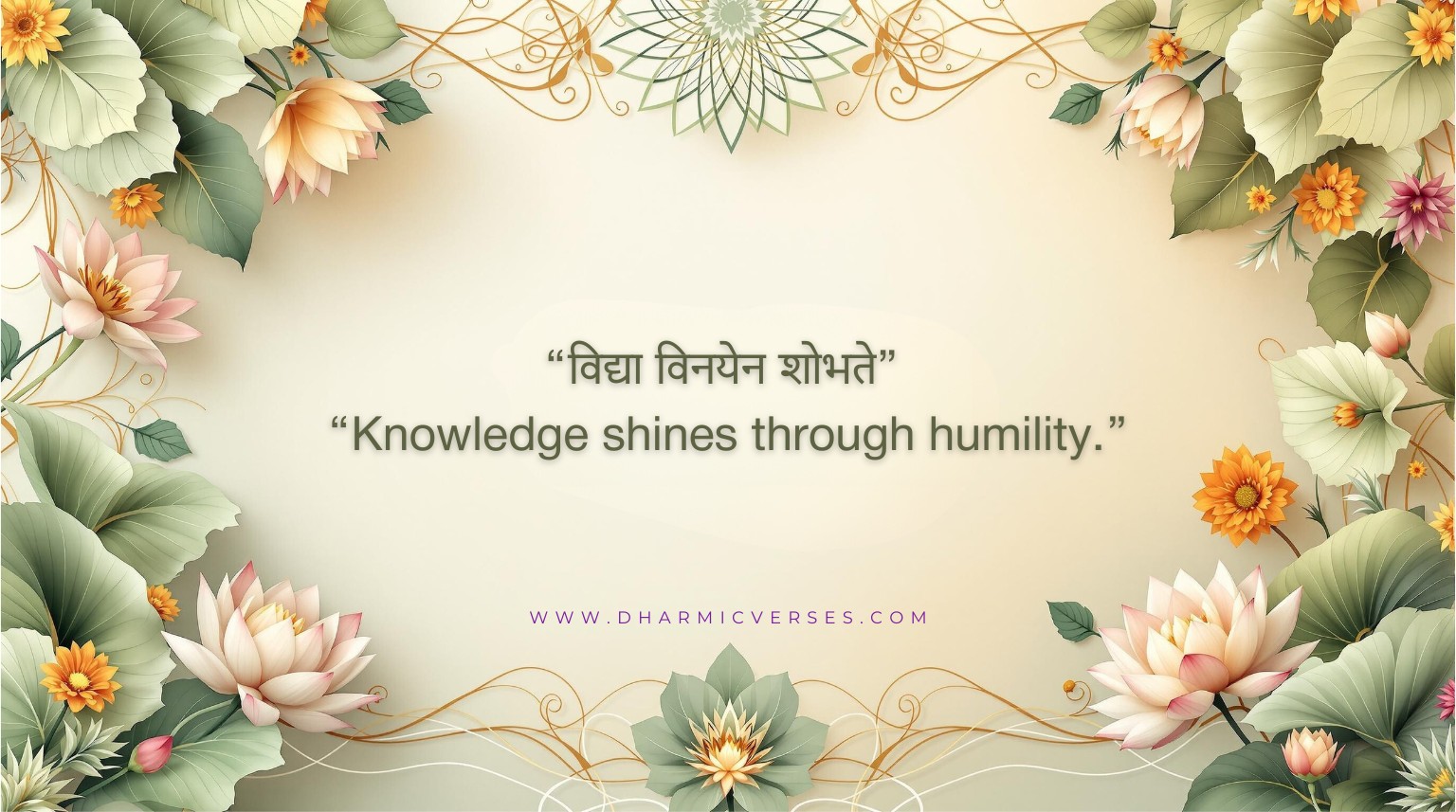
Among the jewels of Sanskrit wisdom, the quote “विद्या विनयेन शोभते” (Vidyā vinayena śobhate) translates to “Knowledge shines through humility.” This succinct yet profound statement emphasizes the relationship between learning and modesty, reminding us that true understanding is not just about accumulating facts but about embodying grace and respect in our interactions with others.
“विद्या विनयेन शोभते” – “Knowledge shines through humility.”
This teaching can significantly alter your perspective on both education and personal growth. Here are some insights to consider:
- The Essence of Humility: Knowledge alone does not equate to wisdom. Humility allows us to remain open to new ideas and perspectives, fostering a mindset conducive to continuous learning. A humble individual will seek knowledge from various sources, appreciating that no one knows everything.
- Building Relationships: When we approach others with respect and humility, we create an environment that encourages collaboration rather than competition. This is particularly important in educational settings where knowledge-sharing fosters community and growth.
- The Ripple Effect: Humble individuals often inspire those around them, creating a ripple effect of kindness and respect. As they demonstrate their values through actions, they motivate others to embrace similar principles, enriching the collective experience.
The implication of “Vidyā vinayena śobhate” resonates deeply in various fields—be it academia, leadership, or personal relationships. For example, consider renowned figures like Mahatma Gandhi who embodied this principle throughout their lives. His profound knowledge was always accompanied by an unwavering sense of humility, allowing him to connect deeply with diverse groups and inspire movements for social change.
This quote is also echoed in modern organizational culture where leaders who exhibit humility foster trust and collaboration within their teams. Research from *Harvard Business Review* indicates that humble leaders tend to have more engaged teams which ultimately leads to improved performance.
As you reflect on “Vidyā vinayena śobhate,” consider how embracing humility can enhance your own learning journey. Are there areas where pride might be obstructing your ability to grow? How can embodying this teaching transform your interactions with others? By integrating this timeless Sanskrit wisdom into your life, you not only enrich your own understanding but also contribute positively towards cultivating a more respectful and compassionate world.
“`
10. यो यच्छ्रद्धः स एव सः (Yo yacchraddhaḥ sa eva saḥ)
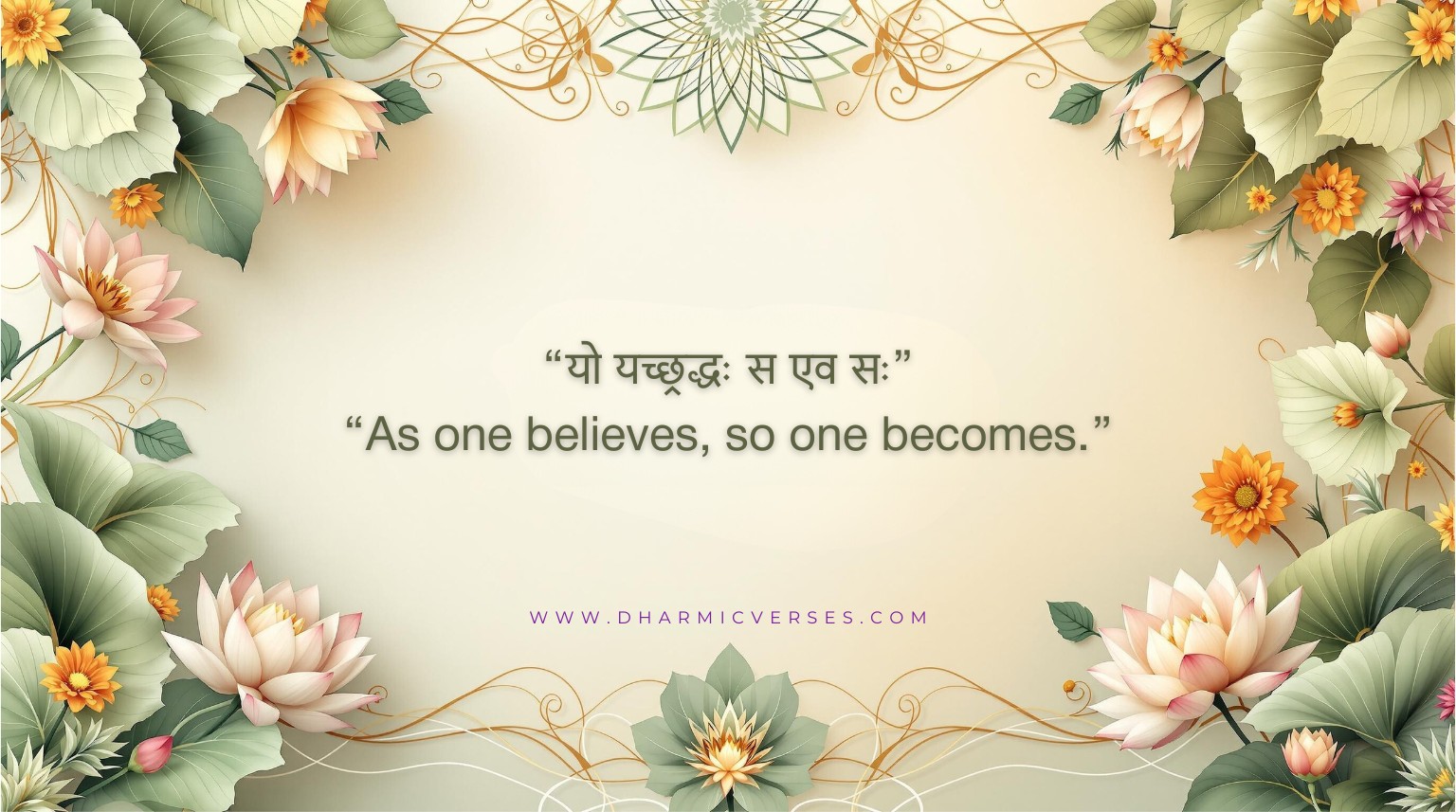
As we reach the final quote in our exploration of unconventional Sanskrit sayings, we encounter a profound teaching encapsulated in the phrase “यो यच्छ्रद्धः स एव सः” (Yo yacchraddhaḥ sa eva saḥ), which translates to “As one believes, so one becomes.” This inspiring Sanskrit quote emphasizes the power of belief and conviction in shaping our realities.
“यो यच्छ्रद्धः स एव सः” – “As one believes, so one becomes.”
This teaching serves as a powerful reminder that our beliefs and thoughts significantly influence our actions and outcomes. Here are several insights that can transform your perspective on life:
- The Power of Positive Thinking: Our mindset plays a crucial role in determining our paths. By cultivating positive beliefs about ourselves and our capabilities, we set the stage for success. A study published in the Journal of Personality and Social Psychology shows that people who maintain an optimistic outlook tend to achieve their goals more frequently than those who do not .
- Self-Fulfilling Prophecies: The phenomenon where individuals’ expectations influence their behavior is known as self-fulfilling prophecy. When you believe you can succeed, your decisions align with that belief, leading to outcomes that reflect your expectations. Essentially, believing something is half the battle won!
- Cultivating Resilience: Challenges are an inevitable part of life. Understanding that your beliefs shape how you respond to adversity can equip you with resilience. Those who hold strong convictions often find ways to navigate difficulties without losing sight of their goals.
The essence of “Yo yacchraddhaḥ sa eva saḥ” resonates across many sacred texts and philosophies. For instance, in the Bhagavad Gita, Lord Krishna emphasizes faith as a driving force behind one’s actions and purpose. This principle echoes throughout motivational literature where belief systems are highlighted as foundational to achieving greatness.
In today’s context, consider how personal beliefs influence various aspects of life—career choices, relationships, and even health decisions. Are there limiting beliefs that hold you back? How might shifting your perspective alter your trajectory? Embracing this timeless Sanskrit wisdom invites us to reflect on the narratives we tell ourselves and encourages us to foster empowering beliefs.
The transformative potential of “Yo yacchraddhaḥ sa eva saḥ” lies in its simplicity: by nurturing positive convictions about ourselves and our aspirations, we pave the way for growth, fulfillment, and success in all dimensions of life. Let this enlightening phrase inspire your journey towards becoming the best version of yourself—after all, becoming who you wish to be starts from within!



Comments are closed.